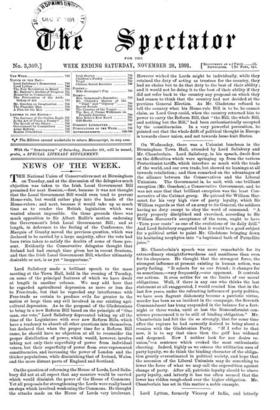for its eloquence. He thought that the strongest force, the
strongest influence at present existing in human action, was party feeling. "It selects for us our friend ; it changes for us sometimes,—very frequently,—our opponent. It controls our actions. It even settles for us the limits of our moral obligations. Well, if there is any one who thinks the last statement at all exaggerated, I would remind him that in the last few years, under the refracting influence of party politics, we have seen flagrant dishonesty become a patriotic virtue, murder has been as an incident in the campaign, the Seventh Commandment has hung suspended in the balance for a fort- night or three weeks, until at last the Nonconformist con- science pronounced it to be still of binding obligation." Mr. Chamberlain had felt the tie so strongly, that for some time after the rupture he had earnestly desired to bring about a reunion with the Gladstonian Party. "If I refer to that now, it is to say that since then the gulf has widened and deepened. Now I neither look for nor desire re. union,"—a sentence which evoked the most enthusiastic cheering. Indeed, highly as we esteem the utilitarian uses of party loyalty, we do think the binding character of the obliga- tion greatly overestimated in political society, and hope that the secession of the Liberal Unionists may do something to lower the force of what we may call the superstition against change of party. After all, patriotic loyalty should be above party loyalty, and latterly it has too often seemed that the lower has ridden rough-shod over the higher obligation. Mr. Chamberlain has set in this matter a noble example.






































